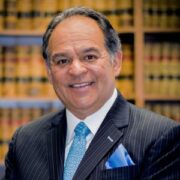

From humble beginnings, Mariano Morales has achieved considerable professional success through hard work, determination, and a profound sense of wanting to make a difference in his lifetime.
Born in Texas to migrant farm-workers, Mariano did not speak English when at age five he entered public school in the state of Washington at a time when bilingual education was not available. He was placed in a special education class, a humbling experience that motivated him to excel in school. By sheer will and tenacity, Mariano overcame the language barrier and became an outstanding student.
Following graduation from high school, Mariano attended the University of Washington and then earned a degree in forest management from Washington State University in 1982. He moved to the Washington, D.C., area to work for the Society of American Foresters, working his way up to the position of Resource Policy Director. Not content with his day job, Mariano squeezed into his busy schedule post-graduate studies in political science at George Washington University, then night classes at the Catholic University’s Columbus School of Law and clerkships at several law firms.
He ultimately decided to return home to the Yakima Valley, where he eventually established his personal injury practice in 1994. His number one goal, he says, is to help promote public safety: “I dedicate my law practice and my life to helping children and families.”
Mariano handles personal injury cases both large and small, with a particular expertise in complicated matters involving traumatic injuries and multiple potential wrongdoers. He has obtained in high-profile cases substantial verdicts and settlements, some of which have led to changes in safety practices for firefighters, at public school bus loading zones and manufacture of safer products.
For over a decade, Mariano has sponsored numerous safety campaigns with public service announcements aimed at educating children – such as say “no” to strangers, poison prevention, fire safety, water safety, and bicycle safety. He also promotes safe driving practices for all ages with his “Arrive Alive” public service announcements.
“My strong commitment to family and safety is the cornerstone to my law practice and my life,” Mariano says.
Mariano devotes the same high standards of professionalism and hard work to every case he handles, giving each client his best effort.
Education
- Washington State University, 1982
B.S. in Forest Management - George Washington University
Post-Graduate in Political Science - Catholic University’s Columbus School of Law
